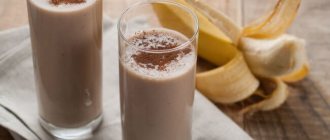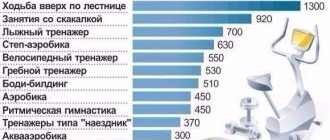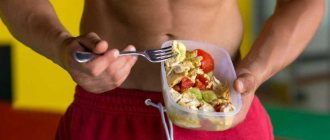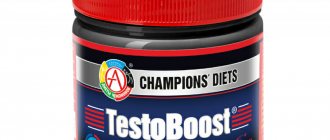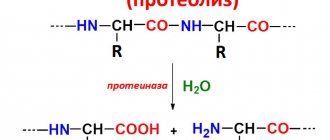Calories, calorie content and their importance for the human body
The main irreplaceable source of this energy, which allows the body to exist and develop, is the food consumed. Each product has its own nutritional and energy value, which is usually measured in calories and kilocalories.
When talking about the calorie content of food, we mean food that has a high energy value, consisting of proteins, fats, and carbohydrates. These three components must enter the human body daily.
For clarity, we can consider the ratio of substances and their energy value for humans:
- 1 g of protein gives 4 kcal;
- 1 g carbohydrates - 4 kcal;
- 1 g fat - 9 kcal.
Calorie surplus
Obviously, the most high-calorie foods, compared to other substances, are fatty foods.
Counting consumed kilocalories is the simplest, most accessible tool that gives 100% results in managing your weight. This method will require a kitchen scale and a kilocalorie calculator online or as an app on your phone.
Important! It is through managing the caloric content of the diet that weight correction occurs.
Menu options
| day 1 | day 2 | day 3 | |
| breakfast | boiled eggs + green peas + sugar-free drink | muesli with natural yoghurt and dried fruits | Oatmeal + boiled egg + tea |
| snack | grapefruit | apple | glass of berries |
| dinner | vegetable soup + whole grain bread + 2-3 cashews + green tea without sugar | salad with vegetables and seafood + drink | cabbage soup with meat + bran bread |
| snack | prunes + dried apricots | tofu | cheesecakes with milk |
| dinner | stewed fish + vegetable salad, sugar free drink | chicken breast with cereal garnish + tomato, sugar-free drink | veal with stewed vegetables + unsweetened drink |
| snack | skim cheese | protein cocktail | Ryazhenka/kefir |
The norm for a person to gain and burn calories depending on lifestyle and physical activity
Calorie deficit
There is such a thing as a person’s basal metabolic rate. This is the amount of energy that it spends to ensure its basic functions: heartbeat, breathing, digestion, growth of new cells... Basal metabolism is expressed in calories, in numerical equivalent it is an average of 1 cal per hour per 1 kg of weight.
This is the amount of energy a person will expend while lying still throughout the day. If the calorie content of food eaten falls below the average level, the body will switch to self-defense mode.
Physical activity and body weight
Even a state of so-called absolute rest presupposes the entry into the body of a sufficient amount of nutrients and energy substances capable of covering the energy costs of ensuring all vital processes.
Physical activity
Physical activity is also classified as an energy-dependent process. It “burns” the energy received from food in excess, beyond what is needed for minimal maintenance. The consequence of this is that the body will not accumulate excess fat as a reserve.
The amount of calories consumed from food and the level of physical activity are the two main levers for managing a person’s body weight. As the caloric content of what you eat increases, you gain weight. In the opposite situation, the mass decreases. A person's weight remains unchanged when a balance is reached between the calories received from food and those spent during physical activity.
Note! Given today's variety of high-calorie foods eaten, the level of physical activity should be equally high.
Laws of proper nutrition
To effectively control and correct weight, it is necessary to implement three basic laws:
- A person’s diet must contain all important nutritional elements in the correct proportions and required quantities: proteins, fats, carbohydrates, minerals, vitamins, fiber, etc.
- Weight loss: the number of calories in should be less than the calories expended. Weight maintenance: the number of calories the body receives is exactly the same amount it spends. Weight gain: more calories in than burned during exercise.
- Drink enough clean water throughout the day.
If you follow all three laws, there will be no problems with the desired weight for each person.
conclusions
Working on yourself and your body is worthy of respect. But keep in mind that unhealthy low weight may be the result of serious problems in the body. Eliminate their likelihood by undergoing a full examination by specialists, and go for it.
Reader’s story “How I lost 18 kg in 2.5 months” I’ve been fat all my life and suffered from excess weight. In clothing stores I chose size L, which by the age of 25 turned into XL and continued to grow. I can tell you for a long time how I tried to fight my 30-35 extra pounds: diets, hunger strike, physical activity, even pills and some kind of conspiracies. The effect was short-lived or absent altogether. In short, despair, depression and almost resignation to one’s enormous weight. But one day I came across... a chocolate bar that helps you lose weight! It didn’t cost me anything to try it - I love chocolates. I ordered it and ate it. And the weight crept down!! It seems like mysticism, but it's true. I began to study the issue and realized how it all works. Girls, try it! I have already lost 18 kg in 2.5 months. And I continue. It's up to you, but you don't lose anything except weight, of course. Try Choco Burn chocolate for weight loss for 147 rubles.
What is a calorie surplus and how many kcal are enough for weight gain
Calorie norm
A caloric surplus is the amount of calories obtained from the daily diet that exceeds the weight maintenance level. In other words, this is a special condition when the calorie intake exceeds the person’s daily caloric intake.
Important! Muscles will not appear out of thin air. Building muscle mass will require additional calories.
How many calories would you need to consume in excess to gain weight? The calculation method will almost most accurately determine the maintenance rate. Having set this value, it is easy to create conditions for weight gain: increase the caloric intake of the daily diet by 10%.
After a week, your weight is checked. When increasing, the calorie intake remains the same. There is no result - they add another 10% and control the weight again after a week. There is an increase - the calorie content remains. The weight is in place - add another 10%. The optimal rate of weight gain is 250-500 g per week.
Weight control
Calorie surplus while gaining muscle mass for men
How many calories are burned when running?
Nutrition for gaining muscle mass for men is based on a calorie surplus. Without understanding the proper process of building muscle, eating to increase the risk of gaining more fat mass than the desired muscle mass.
In this case, you need to clearly think through, balance and calculate your daily diet according to the KBZHU. To grow muscles, men must strictly maintain a balance: 30-35% proteins, 10-20% fats, 50-60% carbohydrates.
Muscle tissue is built by proteins obtained from food, broken down into amino acids in the stomach. From these obtained amino acids, human protein is synthesized, which takes part in the creation of muscle tissue.
Proteins build muscle tissue
Recommended frequency of meals: 5-7 times a day with a mandatory drinking regime - drinking at least 2 liters of clean water. The diet consists of 65% high-calorie foods, 30% vegetables and fruits. Be sure to include meat, milk, and vegetable proteins in the menu.
Rules
Any physical exercise, exercise, even walking on a regular basis changes the body. But the task of building muscle must be solved following certain rules.
- Cardio exercises (long-distance running, cycling, treadmill, walking, swimming) increase muscle endurance, but not their volume.
- Group fitness training (Pilates, port de bras, fitball, taibo, etc.) will also not give the desired effect.
- Working out in the gym with light weights does not suit our goals.
- What really leads to muscle growth (that is, the growth of connective tissue, an increase in glycogen depots) is strength exercises that involve (especially at first, until any specific muscle is required to be worked on) several muscle groups. And with weights so heavy that you simply physically could not do more than 7-10 repetitions.
Important: growth and recovery take up to 48 hours, so there is no point in doing training more often. During this period, you need good nutrition and proper rest!
It is more convenient to start with a personal instructor, this will eliminate mistakes, strengthen the technique of performing the exercise, and protect against injuries.
Calorie surplus when gaining muscle mass for women and girls
Girls need to be careful about keeping a calorie surplus (about 10-15%). This is explained by the fact that the process of muscle growth always occurs together with the active growth of fat cells.
The amount of growth of unwanted adipose tissue for girls will be minimal when the surplus is set to small. The BJU norm for them is as follows: proteins - 30%, fats - 25%, carbohydrates - 45%.
This ratio will maintain the correct amount of amino acids supplied - the main building material of muscles. Girls should eat in surplus periodically.
Note! If you eat high-calorie foods for a long time, the increase in body weight will continue due to the growth of adipose tissue, while the growth of muscle tissue stops.
Fully or partially limited products
A weight gain diet excludes:
- Fresh wheat bread, semolina, puff pastry/butter dough products, pastries, cookies, cakes, pancakes, dumplings, dumplings, waffles, pastries.
- Fatty meat, canned food, goose meat, duck meat, sausages, animal fats, products containing food additives, smoked meats, semi-finished products, fast food products.
- Sugar, chocolate, ice cream, honey, dried fruits (dried apricots, raisins, figs, dates, prunes), condensed milk, sweet desserts, jams, candies, jams.
- Alcohol and caffeinated drinks.
Table of prohibited products
| Proteins, g | Fats, g | Carbohydrates, g | Calories, kcal | |
Vegetables and greens | ||||
| radish | 1,2 | 0,1 | 3,4 | 19 |
| white radish | 1,4 | 0,0 | 4,1 | 21 |
| red radish | 1,2 | 0,1 | 3,4 | 20 |
| black radish | 1,9 | 0,2 | 6,7 | 35 |
| spinach | 2,9 | 0,3 | 2,0 | 22 |
| sorrel | 1,5 | 0,3 | 2,9 | 19 |
Fruits | ||||
| bananas | 1,5 | 0,2 | 21,8 | 95 |
Berries | ||||
| grape | 0,6 | 0,2 | 16,8 | 65 |
Mushrooms | ||||
| mushrooms | 3,5 | 2,0 | 2,5 | 30 |
Nuts and dried fruits | ||||
| raisin | 2,9 | 0,6 | 66,0 | 264 |
Snacks | ||||
| potato chips | 5,5 | 30,0 | 53,0 | 520 |
Cereals and porridges | ||||
| semolina | 10,3 | 1,0 | 73,3 | 328 |
| white rice | 6,7 | 0,7 | 78,9 | 344 |
Flour and pasta | ||||
| pasta | 10,4 | 1,1 | 69,7 | 337 |
| pancakes | 6,3 | 7,3 | 51,4 | 294 |
Bakery products | ||||
| buns | 7,2 | 6,2 | 51,0 | 317 |
Confectionery | ||||
| jam | 0,3 | 0,2 | 63,0 | 263 |
| jam | 0,3 | 0,1 | 56,0 | 238 |
| candies | 4,3 | 19,8 | 67,5 | 453 |
| pastry cream | 0,2 | 26,0 | 16,5 | 300 |
| cookie | 7,5 | 11,8 | 74,9 | 417 |
| dough | 7,9 | 1,4 | 50,6 | 234 |
| halva | 11,6 | 29,7 | 54,0 | 523 |
Ice cream | ||||
| ice cream | 3,7 | 6,9 | 22,1 | 189 |
Cakes | ||||
| cake | 4,4 | 23,4 | 45,2 | 407 |
Chocolate | ||||
| chocolate | 5,4 | 35,3 | 56,5 | 544 |
Raw materials and seasonings | ||||
| mustard | 5,7 | 6,4 | 22,0 | 162 |
| mayonnaise | 2,4 | 67,0 | 3,9 | 627 |
Dairy | ||||
| milk 3.6% | 2,8 | 3,6 | 4,7 | 62 |
| milk 4.5% | 3,1 | 4,5 | 4,7 | 72 |
| cream | 2,8 | 20,0 | 3,7 | 205 |
| sour cream 25% (classic) | 2,6 | 25,0 | 2,5 | 248 |
Cheeses and cottage cheese | ||||
| cheese | 24,1 | 29,5 | 0,3 | 363 |
| cottage cheese 18% (fat) | 14,0 | 18,0 | 2,8 | 232 |
Meat products | ||||
| fatty pork | 11,4 | 49,3 | 0,0 | 489 |
| pork liver | 18,8 | 3,6 | 0,0 | 108 |
| pork kidneys | 13,0 | 3,1 | 0,0 | 80 |
| pork fat | 1,4 | 92,8 | 0,0 | 841 |
| salo | 2,4 | 89,0 | 0,0 | 797 |
| beef liver | 17,4 | 3,1 | 0,0 | 98 |
| beef kidneys | 12,5 | 1,8 | 0,0 | 66 |
| beef brains | 9,5 | 9,5 | 0,0 | 124 |
| bacon | 23,0 | 45,0 | 0,0 | 500 |
Sausages | ||||
| smoked sausage | 16,2 | 44,6 | 0,0 | 466 |
| smoked sausage | 9,9 | 63,2 | 0,3 | 608 |
| sausages | 10,1 | 31,6 | 1,9 | 332 |
| sausages | 12,3 | 25,3 | 0,0 | 277 |
Bird | ||||
| smoked chicken | 27,5 | 8,2 | 0,0 | 184 |
| duck | 16,5 | 61,2 | 0,0 | 346 |
| smoked duck | 19,0 | 28,4 | 0,0 | 337 |
| goose | 16,1 | 33,3 | 0,0 | 364 |
Fish and seafood | ||||
| smoked fish | 26,8 | 9,9 | 0,0 | 196 |
| salted fish | 19,2 | 2,0 | 0,0 | 190 |
| Red caviar | 32,0 | 15,0 | 0,0 | 263 |
| black caviar | 28,0 | 9,7 | 0,0 | 203 |
| canned fish | 17,5 | 2,0 | 0,0 | 88 |
| cod (liver in oil) | 4,2 | 65,7 | 1,2 | 613 |
Oils and fats | ||||
| creamy margarine | 0,5 | 82,0 | 0,0 | 745 |
| vegetable-fat spread | 0,0 | 40,0 | 0,0 | 360 |
| animal fat | 0,0 | 99,7 | 0,0 | 897 |
| cooking fat | 0,0 | 99,7 | 0,0 | 897 |
Non-alcoholic drinks | ||||
| instant coffee dry | 15,0 | 3,5 | 0,0 | 94 |
| Pepsi | 0,0 | 0,0 | 8,7 | 38 |
| sprite | 0,1 | 0,0 | 7,0 | 29 |
| black tea | 20,0 | 5,1 | 6,9 | 152 |
| * data is per 100 g of product | ||||
Advice from nutritionists and trainers
To properly build muscle, follow these recommendations:
- Eating in small portions, which helps the body wean itself from storing fat for future use.
- Competent adherence to BZHU ratios. Properly balanced daily caloric intake.
- You should not skip workouts to gain muscle mass, especially when you are in a surplus.
Calorie intake occurs periodically: regular caloric intake alternates to maintain current weight with a period of surplus. This nutritional strategy promotes muscle gain while preventing the deposition of excess fat.

